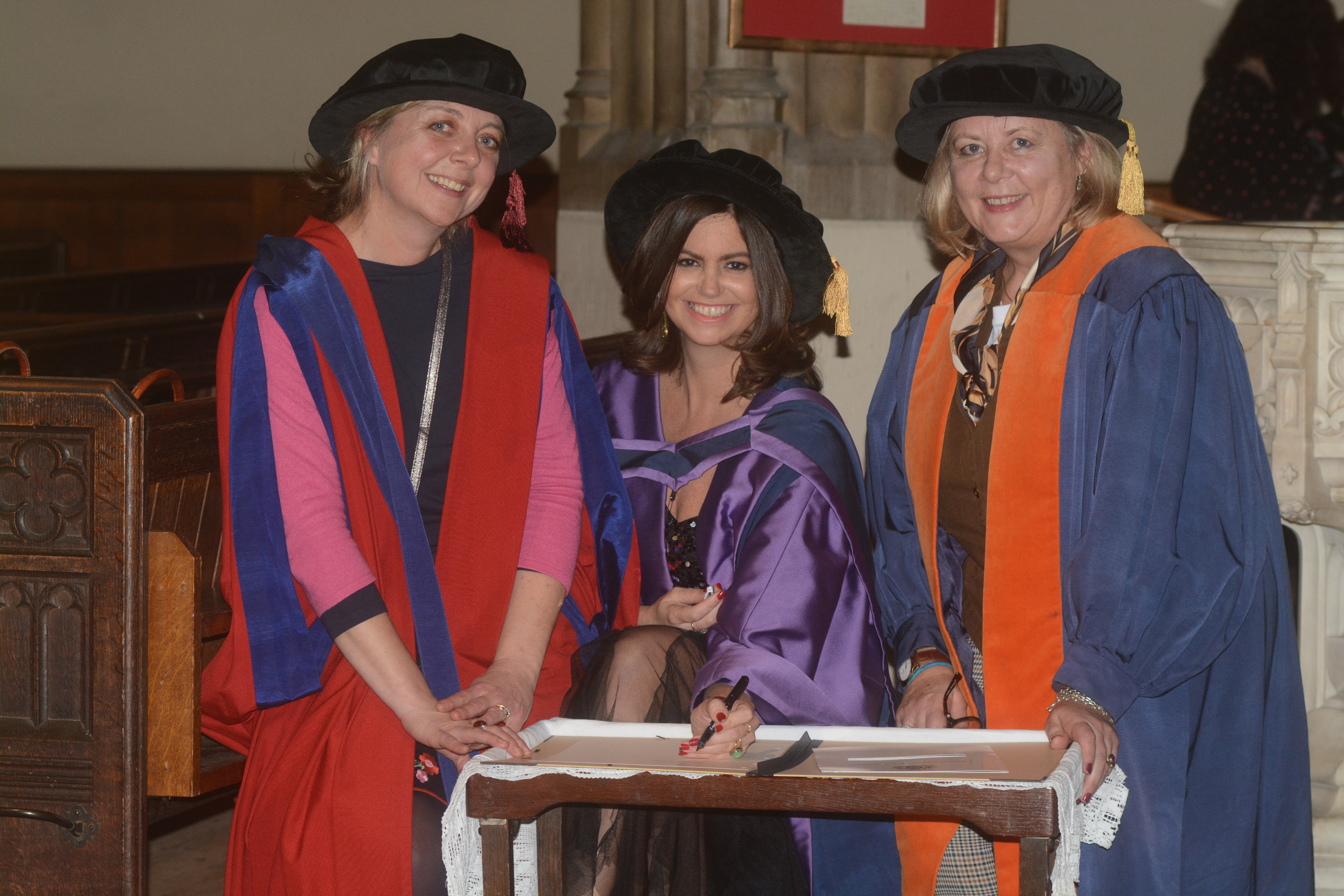
You may know Deborah James by one of the many ‘hats’ she wears – as one of the presenters of You, Me and the Big C podcast for BBC Radio 5 Live, the blogger @bowelbabe with 97,000 followers on Instagram, a columnist in The Sun, writing weekly updates for Things Cancer Made Me Say, a stage 4 bowel cancer patient at The Royal Marsden, or a busy mum with two children – Hugo, 12, and Eloise, 10. But now Deborah could also be known as Dr James, after being awarded a Degree of Doctor of Civil Law, honoris causa, at the Royal Marsden School’s graduation ceremony in November.
‘I was absolutely blown away to receive an honorary degree,’ she says. ‘I had no idea I was going to get it – the first I heard was when I received a letter from the Dean of University of East Anglia [the School’s academic partner] a couple of months before graduation.’ Deborah was awarded the doctorate in recognition of her campaigning and fundraising work, and also for the work she does for the Royal Marsden School. Dr Rebecca Verity, Director of the School, says, ‘Deborah is well known by our students, as she often provides invaluable insights into the patient journey, speaking on many different courses at the School.’
Deborah, 38, was a successful deputy head teacher, helping to turn around failing schools, when she was diagnosed with metastatic bowel cancer in 2016. Since then, she’s had 10 operations including bowel and lung resections, and multiple rounds of chemotherapy – she’s still undergoing treatment at The Royal Marsden. But rather than ‘disappear into a cancer cave’, Deborah started a blog to help debunk the idea that young women don’t get bowel cancer. Her open, honest, and amusing approach to dealing with her diagnosis gained her friends and fans online, and the podcast and column soon followed.
Despite her well-deserved reputation for helping others navigate their way through the maze of cancer myths and facts, Deborah didn’t feel as though she had earned her honorary doctorate. ‘On the day, I was surrounded by all these incredible nurses and other healthcare professionals and I didn’t feel like I deserved to be there,’ she says. ‘I think what they do is amazing; I could never do their job. At one point in my life I thought I wanted to be a doctor, but then I realised I’d have to see all the blood, guts and gore, and that was a 100% no from me!’
During the graduation ceremony, Deborah was invited to make a speech and she took the opportunity to remind the new graduates about what, or rather who, should be at the heart of their career choices. She says, ‘I wanted them to remember us: the patients. Critical care improves the lives of – and saves – people like me, and we couldn’t be more grateful. When they get bogged down in their careers and fed up with the minutiae of life, then remember us. Their job is incredibly important to everyone they will ever work with, and they will gain more out of it than they will ever realise.’
Critical care improves the lives of – and saves – people like me
When it comes to plans for the future, Deborah’s is also looking more positive. In January this year, her latest scan revealed she has no evidence of cancer in her body. The news hit the national headlines, and the reaction from both her online audience and strangers who’d just discovered her story was overwhelming. ‘The whole thing has snowballed a bit!’ she laughs. ‘But I’m not cured – there’s a big difference. I’m still having treatment, under the care of Professor David Cunningham at The Royal Marsden, so I take daily tablets and I have an infusion of targeted drugs every two weeks. No evidence of disease doesn’t mean that I’m completely disease-free.’
Her cautious approach is because she’s been in this situation before. In April 2018, a scan showed she had no evidence of active cancer in her body, but after 12 weeks it had returned. The news was crushing to deal with but Deborah understands why her story inspires people. She says, ‘Everyone wants stories of hope. I live a pretty regular life – I’m active, I go to the pub, go to the cinema, meet my mates, and I have a couple of kids that I complain about! My cancer is aggressive, and those with it die quickly, so people need examples of people with cancer just getting on with it. We want to hear about people bucking the trend, and I know I’m an example of that.’
For now, she’s keen to focus on her treatment and get back to work for the School. ‘I’ve already taught on the palliative care and communication modules, but I’ll do whatever they want me to do,’ she says. ‘I love teaching so it’s great going back into a classroom. Education is my passion; I thought I would get over it when I was diagnosed three years ago, but I haven’t. It’s always inspiring to be back in an educational environment, and it’s a real privilege for me to educate on whatever platform that might be.’
• Deborah has written about her experiences in F*** You Cancer: How to face the big C, live your life and still be yourself (£9.99, Penguin) and plans to release a second book later this year
